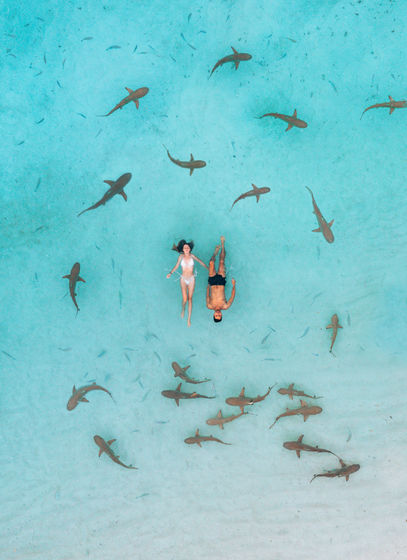Is it effective in enlightening activities to alert sharks not to eat?

Shark bites are rare. Here are 8 things to avoid to make them even rarer
https://theconversation.com/shark-bites-are-rare-here-are-8-things-to-avoid-to-make-them-even-rarer-173746
Australia's Queensland Government, which is blessed with one of the world's leading marine resources and has a thriving tourism industry, is developing the 'Shark Smart Movement', which is an educational activity that summarizes lessons such as avoiding swimming at dawn and dusk when sharks are active. However, some tourists do not follow these calls.

Therefore, Reef Ecologic, a consulting company engaged in environmental protection and sea safety activities, has collaborated with three tourist operators operating charter boats in the Whitsunday region, which
Specifically, 'Show a short educational video to tourists going out to sea' 'Put a sticker on the boat that describes how to reduce the risk of encountering sharks' 'Distribute Shark Smart movement pamphlets to tourists' 'Food Awareness-raising activities were carried out by the method of 'distributing garbage bags for disposal.' Then, we observed the behavior of tourists with and without enlightenment and verified the effect of enlightenment.
The following eight 'behavioral patterns that increase the risk of accidents caused by sharks' were observed.
・ Raise the spray.
・ Swim alone.
・ Swim in places where shark accidents have occurred in the past.
・ Swim near the person who is catching the fish.
・ Catch fish near the person who is swimming.
・ Sprinkle bait.
・ Throw food into the sea.
・ Throw pieces of fish into the sea.

During the survey period, 228 tourists went out to sea by boat, of which 92 went out to sea before the enlightenment activities and 136 tourists went out to sea after the enlightenment activities. .. And when we analyzed the behavior of these tourists, we got the following results.
・ The behavior of making noise and splashing during swimming and snorkeling decreased by 8.9%.
・ The number of people who throw away pieces of fish decreased by 4.1%.
・ The number of people who catch fish near swimming people decreased by 3.8%.
Also, when we asked tourists, most of them 'avoid swimming at dawn or dusk', 'swim with other people', 'swim in clear water', 'garbage where people swim', etc. It was also found that they became aware of actions to avoid the risk of sharks, such as 'do not throw away sharks' and 'keep away from shark feeding fish and flock of birds jumping into the sea'.
In a survey conducted separately from this survey, 'Although 100% of tourists knew that garbage should not be dumped in the sea, about one-third dumped it in the sea. However, it is said that the percentage of people who throw garbage into the sea has decreased to about 4 to 8% due to educational activities.
Adam Smith, a marine scientist at James Cook University in Australia, commented on the findings: 'Thanks to the SharkSmart movement, tourists have stopped dumping garbage in the water and accidents have occurred in the past. The good news is that we're no longer close to the places we 've been to, but unfortunately some people who use the waterside still have the spirit of 'She'll be right ', which changes this consciousness. It will still take some time. '
Related Posts:
in Creature, Posted by log1l_ks







